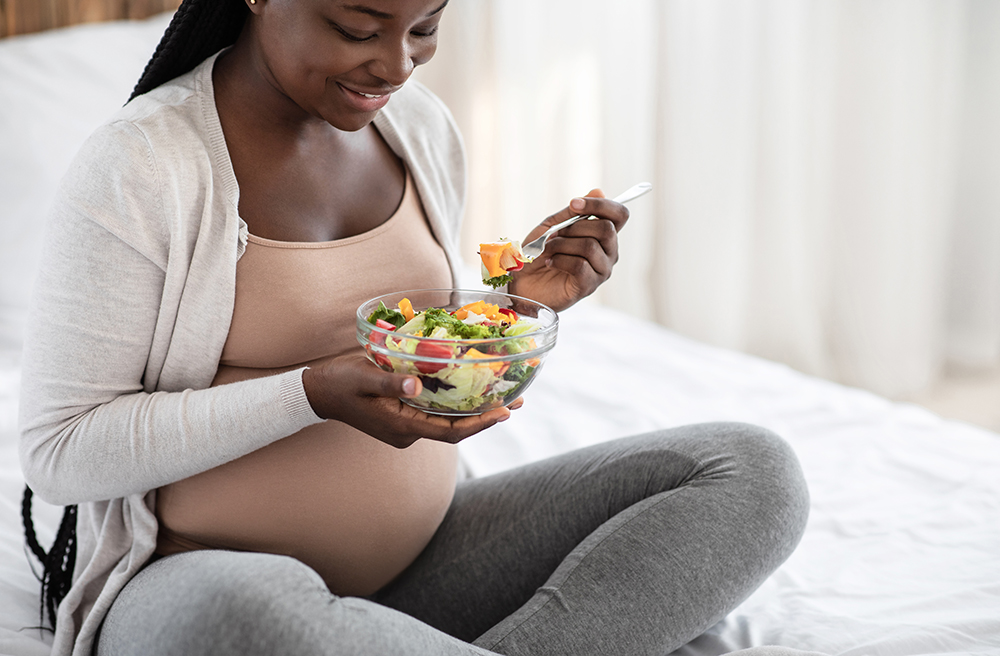Thursday, May 4, 2023
Oh Baby! 6 Tips for a Healthy Pregnancy
If you’re planning to have a baby now or in the future, it’s never too early to start thinking about your prenatal health. Practicing healthy habits during pregnancy can ensure proper brain development, a healthy birth weight and better overall health for your newborn. And, as a birthing parent, staying healthy during pregnancy can soothe some of your unpleasant pregnancy symptoms, like fatigue and morning sickness, and reduce the risk of complications during childbirth.
There’s so much information out there, it can be hard to know where to start. So let’s get back to basics. Here are six simple tips to follow on the path to better prenatal health.

1. Get regular prenatal care
Visiting your obstetrician regularly is key to monitoring fetal development and checking up on your health as the birthing parent. “Routine care helps us screen for infections or chronic conditions that could affect your pregnancy, and coordinate care to treat any conditions that arise,” says Timothy Rydell, MD, Chief of OB/GYN at WMCHealth’s St. Anthony Community Hospital. “Your obstetrician can also give you guidance on vaccinations, vitamins and lifestyle changes you might need to make during pregnancy.”
2. Eat a balanced diet
Eating plenty of nutrient-dense foods is good for anyone’s overall health. But remember, as a birthing parent, you’re feeding both yourself and your baby. Prenatal vitamins can also help you get an adequate amount of the nutrients you need during pregnancy. A healthy prenatal diet includes:
- Folic acid, found in fortified cereals, asparagus, lentils and oranges
- Calcium, found in yogurt and dark leafy greens
- Iron, found in lean meat and dried beans
- Iodine, found in iodized table salt and eggs
- Choline, found in peanuts, eggs and soy products
- Vitamin A, found in carrots, leafy green vegetables and sweet potatoes
- Vitamin C, found in citrus fruit, broccoli and tomatoes
- Vitamin D, found in sunlight
- Vitamin B6, found in beef, whole grain cereals and bananas
- Vitamin B12, found in meat, poultry and milk (vegetarians should take a supplement)
In addition, part of having a healthy prenatal diet is drinking plenty of water. “During pregnancy, your blood volume increases by up to 50 percent in order to supply oxygen and nutrients to your baby and carry waste and carbon dioxide away,” says Dr. Rydell. “You need to drink more water to support the increase in blood volume. Aim for 8-10 glasses per day.”
3. Exercise regularly
Physical activity during pregnancy has been shown to reduce the risk of gestational diabetes and cesarean sections (C-sections), as well as shorten postpartum recovery time. “If you’re already exercising regularly, it’s probably safe to continue your normal physical activity with approval from your doctor,” says Dr. Rydell. “If you’re new to exercise, be sure to consult your doctor before you start any new routines.” Low-impact exercises like walking, yoga and stationary cycling are generally safe for pregnant people.
4. Get an adequate amount of sleep
Lack of sleep during pregnancy can lead to a higher risk of preeclampsia, gestational diabetes, C-section and long labor. “If you’re having trouble sleeping at night, try relaxation techniques and stress reduction before bed,” says Dr. Rydell. “Make sure your bedroom is dark, cool and comfortable, put screens away right before you sleep and try not to drink a lot of water before bed.” Talk to your doctor if you’re still having trouble getting enough sleep — they can help diagnose any underlying sleep conditions and prescribe a treatment plan.
5. Avoid harmful substances
It’s well known that alcohol, cigarettes and other illicit drugs can be harmful to the development of your child. These substances should be avoided during pregnancy. Caffeine is safe in small amounts, but you should limit your caffeine intake as much as possible. “Also be sure to steer clear of harsh chemicals found in cleaning solutions,” says Dr. Rydell. “And if you have a cat, get your partner or a friend to help you clean the litter box, as cat feces is host to a parasite that causes a condition called toxoplasmosis.”
6. Build a support network
Pregnancy can have a big impact on your mental health, so building a support network of family and friends is essential to taking care of your prenatal health. “Don’t be afraid to ask for help with everyday tasks. Your friends and family probably want to lend a helping hand during this time, so delegate things like cleaning, cooking and running errands to free up your time to rest before childbirth,” says Dr. Rydell. “In addition, connecting with other people who are pregnant can give you support to get through the ups and downs of pregnancy from a group who understands what you’re going through.”
To support you during your pregnancy, the Kennedy Birthing Center at WMCHealth’s St. Anthony Community Hospital in Warwick offers prenatal childbirth education, breastfeeding and newborn care classes. Once you are ready to deliver your baby, the birthing center provides modern medical care, an expert, attentive staff, and an array of amenities – in a serene, homelike setting. Innovative techniques include Gentle C-Sections, Delayed Newborn Bathing and Couplet Care, all in one room for labor, delivery, recovery and postpartum. For more information about the Kennedy Birthing Center at St. Anthony, visit Birthing Center.